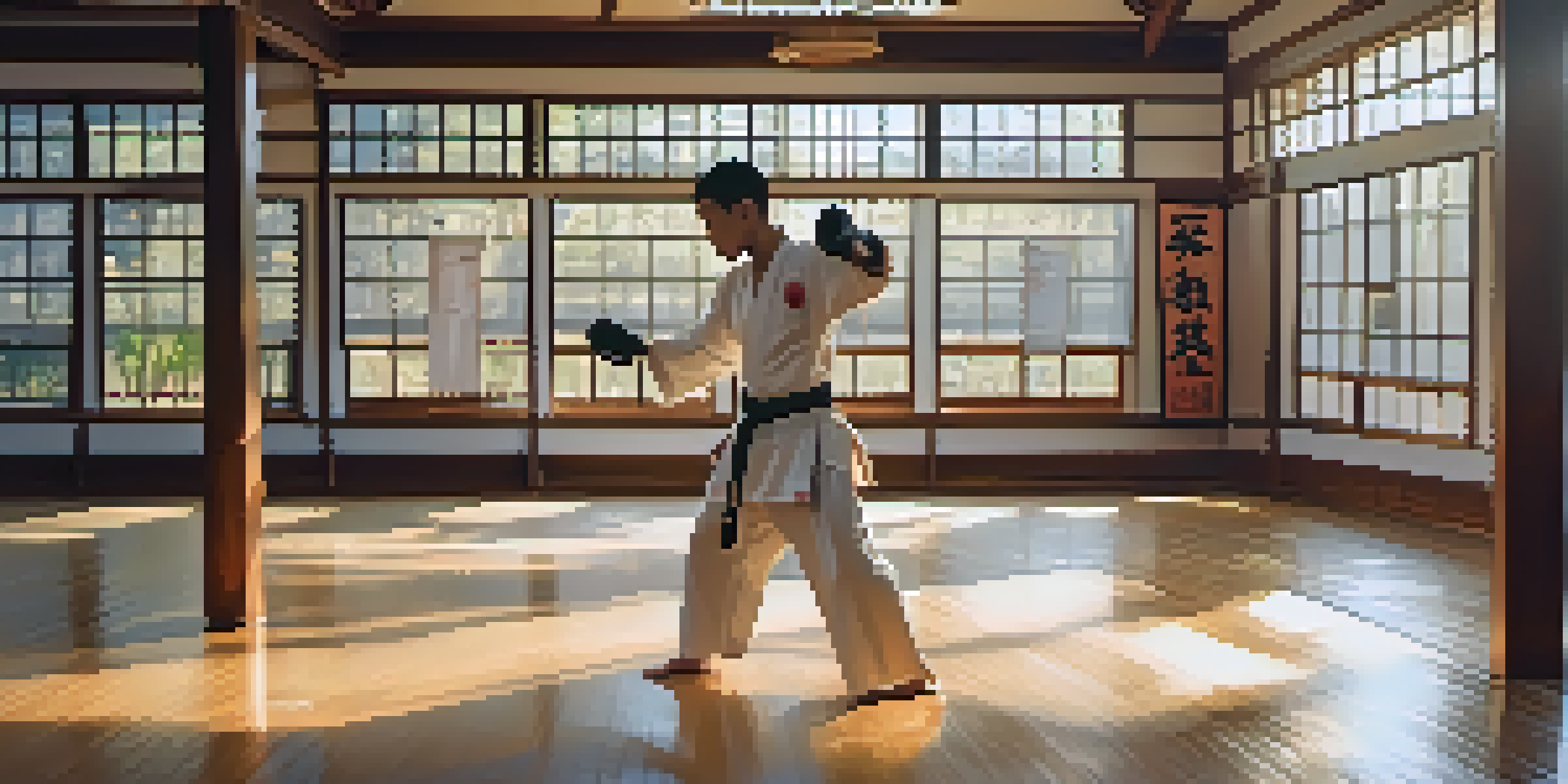The Influence of Training on Self Defense Psychology

Understanding Self Defense Psychology
Self defense psychology is the mental framework that influences how individuals react in threatening situations. It encompasses various factors, including fear response, decision-making, and stress management. By understanding this psychology, we can better prepare ourselves for real-life encounters where self-defense might be necessary.
The greatest weapon against stress is our ability to choose one thought over another.
In essence, the way we think and feel during high-pressure moments can dictate our actions. For example, someone who has trained in self defense may find that their mind remains clear, allowing for better judgment when faced with danger. This mental clarity can be the difference between effectively defending oneself or succumbing to panic.
Moreover, recognizing the psychological components of self defense helps in building resilience. Training not only enhances physical skills but also instills confidence and reduces anxiety, enabling individuals to face threats with a composed mindset.
The Role of Training in Shaping Responses
Training plays a crucial role in shaping how we respond to perceived threats. Through consistent practice, individuals learn to control their physiological responses, such as adrenaline surges, which can cloud judgment and impair performance. This is akin to a musician practicing to hit the right notes during a performance; repetition helps make responses automatic.

For instance, martial arts training often includes scenario-based drills that simulate real-life confrontations. These exercises help practitioners develop instincts and muscle memory, which are vital when split-second decisions are required. Such training transforms abstract concepts of self defense into tangible reactions, making them accessible in emergencies.
Self Defense Psychology Matters
Understanding self defense psychology helps individuals prepare mentally for threatening situations.
As a result, trained individuals are more likely to remain calm and focused when confronted with danger. This mental preparedness is a testament to the power of structured training in enhancing self defense psychology.
Building Confidence Through Training
One of the most significant psychological benefits of self defense training is the boost in confidence it provides. Engaging in consistent practice helps individuals feel more capable of handling potential threats, which is especially important for those who may have previously felt vulnerable. This newfound confidence can permeate other areas of life, fostering a more assertive mindset.
Fear is the mind-killer. Fear is the little-death that brings total obliteration.
Confidence gained from training can also reduce fear and anxiety associated with self defense scenarios. For example, a person who has completed several self defense classes may feel less intimidated when walking alone at night, knowing they have the skills to protect themselves. This shift in perspective can be empowering.
Additionally, confidence from training encourages individuals to engage in proactive rather than reactive behaviors. They learn to assess situations more critically, helping them avoid conflicts altogether or de-escalate confrontations before they turn violent.
The Importance of Mental Conditioning
Mental conditioning is an essential aspect of self defense training, preparing individuals to face high-stress situations. This involves developing a positive mindset, visualizing success, and employing relaxation techniques to manage stress. Just as athletes mentally prepare for competitions, self defense practitioners must also cultivate mental resilience.
For example, visualization techniques can help individuals mentally rehearse a self defense scenario, allowing them to anticipate their responses. This practice can create a sense of familiarity, making real-life situations less daunting. The more they visualize, the more their brain becomes conditioned to react appropriately when it matters.
Training Builds Confidence
Consistent self defense training boosts confidence, enabling individuals to handle potential threats more effectively.
Ultimately, mental conditioning complements physical training, creating a well-rounded approach to self defense. It equips individuals not just with techniques, but also with the mental fortitude to execute them effectively under pressure.
Dealing with Post-Traumatic Stress
Training in self defense can also play a role in addressing post-traumatic stress (PTS) symptoms. Individuals who have experienced violence or threats may struggle with anxiety, flashbacks, or hyper-vigilance. Engaging in self defense training can empower them to reclaim a sense of control over their lives.
Self defense classes provide a supportive environment where individuals can confront their fears in a structured manner. This exposure can help diminish the power of traumatic memories, allowing participants to process their experiences in a safe space. As they learn new skills, they also build a community of support and understanding.
In essence, self defense training offers a dual benefit: enhancing physical skills while also promoting mental healing. It can serve as a vital tool for those navigating the aftermath of trauma.
The Social Dynamics of Self Defense Training
Self defense training often takes place in group settings, fostering social connections among participants. This social dynamic can significantly influence the psychological benefits of training, as individuals share experiences and support one another. Such camaraderie can help reduce feelings of isolation that might accompany fear of violence.
Moreover, the diverse backgrounds of participants can enrich the training experience. When people from different walks of life come together, they can learn from each other's perspectives and strategies. This exchange not only enhances skills but also builds empathy and understanding.
Social Dynamics Enhance Learning
Engaging in group self defense training fosters social connections that enrich the learning experience and provide support.
As these connections deepen, individuals may find increased motivation to continue their training. The social aspect becomes a source of encouragement, making the journey of self defense training not just about personal safety, but also about community building.
Conclusion: The Holistic Impact of Training
In conclusion, the influence of training on self defense psychology is profound and multifaceted. It enhances physical capabilities while also cultivating mental resilience, confidence, and social connections. This holistic approach ensures that individuals are well-prepared not only to defend themselves but also to thrive in various aspects of life.
As we’ve explored, the benefits of training extend far beyond mere techniques. They encompass psychological readiness, emotional healing, and social support, creating a well-rounded individual who can respond effectively to threats. The journey of self defense training is indeed a transformative experience.

Ultimately, the impact of training on self defense psychology emphasizes the importance of preparation in empowering individuals. By investing in self defense training, one not only gains skills but also embraces a proactive and resilient mindset that can serve them in countless situations.